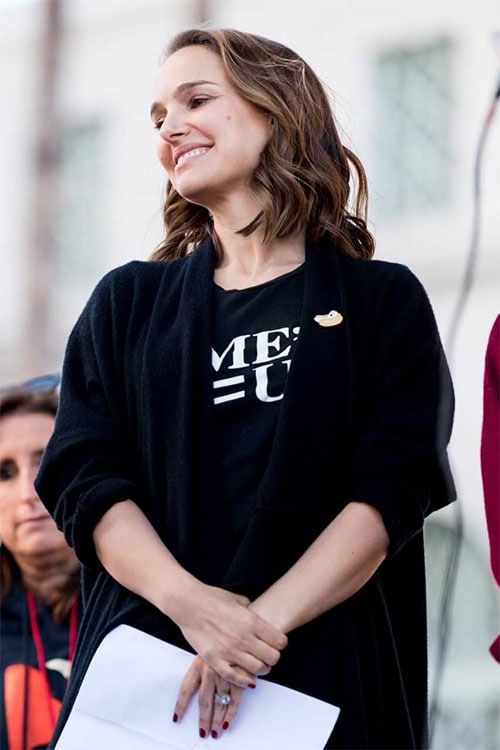
Sexual terrorism. When those two words are put next to each other (though they never should be), it evokes horrifying images of human trafficking and women being forced into sex slavery or trade. It reminds us that women in countries ravaged by wars are, even now, being raped every day as a form of revenge, or in the name of ethnic cleansing. It brings to mind child brides being forced to perform sexual acts on men old enough to be their fathers, sometimes grandfathers... It makes us want to curl up in a fetal position and cry over how low humanity is capable of stooping.
But is sexual terrorism only about the ghastly acts that most of us only read about, and guiltily thank whatever it is we believe in, that at least it wasn't us or our loved ones? No it's not. It's far more pervasive and corrosive than that; only, it doesn't always come in the form of gruesome attention-grabbing headlines.
Ask Natalie Portman, she knows.
In less than two minutes, with a poignant speech about her experience of growing up in the public eye, with a culture that benevolently allowed and was accepting of grown men sexualising the bodies of young girls barely into their teens, Hollywood actress Natalie Portman cut to the heart of the problem of sexual terrorism, a kind of societal cancer that spreads quietly and quickly, and claims all kinds of freedoms of women as its victim. It's a that practically every woman, celebrity or not, can relate to.

Natalie Portman at the Women's March in Los Angeles (Image Credit: AFP)
While attending the Women's Day march in Los Angeles on Saturday, Natalie spoke about how, after the release of her first film Leon: The Professional in 1994, as a 13-year-old, she opened her first fan letter to read a rape fantasy a man had written to her, and how a local radio station started a countdown to her 18th birthday - the age when it would ostensibly be legal to have sex with her. She spoke about movie critics who mentioned her budding breasts in their reviews, and how all of it made her double down on creating an iron-clad image as a conservative, serious, nerdy and prudish person.
"I understood, very quickly, even as a 13-year-old, that if I were to express myself sexually, I would feel unsafe and that men would feel entitled to discuss and objectify my body to my great discomfort," she said.
"I felt the need to cover my body and to inhibit my expression and my work in order to send my own message to the world that I'm someone worthy of safety and respect. The response to my expression, from small comments about my body to more threatening deliberate statements, served to control my behaviour through an environment of sexual terrorism," Natalie concluded.
The speech was shocking and quickly went viral, but only because we're not used to hearing celebrities speak with such deliberate frankness about the feeling of being held back, and of not being allowed to have their say, despite the power and privilege they enjoy. They have images to protect, and admitting to weakness, and to the awful feeling that belittlement leaves behind, is not part of the 'glamorous' story often being sold.
It's commendable that she spoke about it, but ask any woman if Natalie's experience is a common one, and you would be hard-pressed to find one who doesn't have a scarily similar story to tell.

Natalie Portman spoke about receiving fan mail with rape fantasies at 13 (Image Credit: AFP)
You don't have to be a move star to learn, very early in life, that there are sexual predators lurking everywhere. Natalie may have encountered hers while reading fan mail, or hearing herself been spoken of like a dispensable sex object on the radio, but they're just as easily found in buses, trains, the very roads we walk on, sometimes even at home.
For most of us (especially in India and other Eastern cultures) as soon as our bodies began showing the slightest signs of impending womanhood, there was someone who would magically appear to train us in the art of finding morality in dress codes. And they just had to be adhered to. Using clothes, or our bodies, to express ourselves, our beliefs, our thoughts and our individualities was an alien concept. It still is, for an overwhelming number of women. Clothes became a weapon and our bodies became tools that were used against us, to keep us in control.
Is there any woman, ever, who hasn't responded to a set of lascivious, prying eyes with an instinctive, uncomfortable tug on her hemline or pull on her neckline, even if she's later returned to excoriate the man behind the eyes? The conditioning is so deeply entrenched, so much a part of our psyche, it could be embedded in our DNA. Self-censorship of our bodies and its reactions isn't a choice most of us make, it is part of our neuromuscular memory. The conditioning starts early, and, for some, never ends.
And that, truly, is successful terrorism.
When you teach generations of little girls to tether their bodies to impossible sexist notions of morality, just so they can live in the illusion that if they quietly toe the line, they can stay safe. Only to find out one day that even if you play by all the rules in the book, you're still not safe.
If this isn't the most effective form of terrorism, what is?
Track Latest News Live on NDTV.com and get news updates from India and around the world
